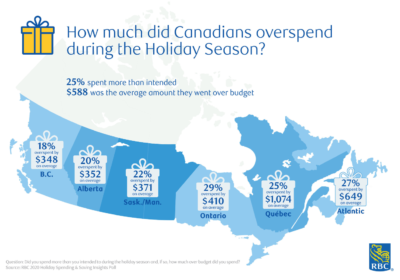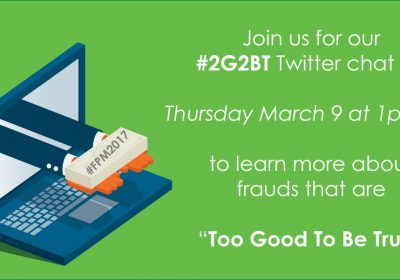- Stats: 1579 0
- Author: Linda
- Posted: March 1, 2021
- Category: Fraud and Scams, RBC
22% of Canadians say they have been increasingly targeted by fraudsters during the pandemic
Canadians are spending more money and time online than ever before and so are savvy cyber criminals who are leveraging the pandemic to increasingly gain access to personal and financial data. During Fraud Prevention Month, RBC is educating Canadians on what to watch out for given more Canadians are being targeted by fraudsters during this difficult time.
Criminals are becoming more sophisticated in the methods they use to gain access to Canadians’ information. According to the research, since the start of the pandemic:
- 44% of respondents have received a call from someone claiming to be from a reputable source, like a bank or government, asking for personal or financial information
- 28% have been contacted by scammers who already had some of their personal information
- 28% have been contacted by someone pretending to be from a legitimate source, like work or law enforcement, asking them to buy retail gift cards and to pay for things like a fine or fee
- 10% have been contacted about a fraudulent job offer or investment opportunity
- 10% have received an email or text directing them to a fake website related to COVID-19
“COVID-19 has created the perfect environment for fraudsters to try to gain access to Canadians’ personal and financial information,” says Jason Storsley, Vice-President, Fraud Management, RBC. “This includes an increase in phishing scams as people continue to spend more time online, whether shopping, using social media or searching for information about the pandemic, making it more likely to click on or respond to fraudulent requests.”
While a quarter of respondents (24%) say they have taken added steps since the start of the pandemic to protect their personal and financial information from fraud, many Canadians are still putting their information at risk. The research found that:
- More than a third of respondents (34%) have used the same password for online or mobile banking as they use for other online accounts (rising to 44% for ages 18-34)
- 28% have logged into online or mobile banking while using public Wi-Fi (41% for ages 18-34)
- 23% have sent an email money transfer and used a security question that is easy to guess (38% for ages 18-34)
- 15% have used personal information, such as a birthday, address or phone number, for their online or mobile banking password (18% for ages 18-34)
“It’s no surprise that we see an increase in these risky behaviours among younger Canadians as their comfort level with technology if generally higher, which can create a false sense of security when it comes to the risk of fraud,” says Storsley.
Financial Impact of Romance Scams on the Rise
According to the Canadian Anti-Fraud Centre, in 2020, romance scams became the number one fraud affecting Canadians based on dollar loss at $18.5 million. Thirteen per cent of poll respondents (13%) said they have been contacted online by someone they now know was a scammer trying to develop a relationship with them since the start of the pandemic.
A romance scam is where a cyber criminal pretends to be romantically interested in someone, often through dating or social networking sites. The criminal’s goal is to establish a relationship as quickly as possible, endear themselves to the victim to gain trust and eventually to convince the victim they have fallen in love. The scammer then asks for money, often claiming it is needed for an emergency or for airfare to visit the victim or asks for photos or personal information that can then be used to blackmail the victim.
“Social distancing measures have caused many Canadians to feel isolated, and as a result, they may be more trusting and vulnerable. Fraudsters are taking advantage of this with romance scams,” says Storsley. “Unfortunately, common targets for these types of scams are widows and widowers, but criminals will target anyone eager for a new relationship.”
“It’s important not to share financial information if you find yourself getting close to someone online. If you suspect an online relationship is a scam, stop all contact immediately and call the police and your bank right away if you have sent money or shared your financial information.”
Storsley adds that regardless of the type of fraud, there are easy steps Canadians can take to help keep their personal and financial information safe. RBC encourages Canadians to visit the resources below to learn more about the risks and how to protect their information:
- How to Protect Against Today’s Cyber Crimes
- 6 Ways to Protect Yourself from COVID-19 Scams
- Protecting Yourself From Fraud
- How Cyber Savvy Are You? Take Our Quiz to Find Out
“RBC protects clients by investing in new technologies, maintaining rigorous security procedures and having a team of fraud experts who work around the clock to prevent, detect and investigate fraud,” adds Storsley. “Even with fraudsters taking advantage of the pandemic environment, billions of transactions safely take place each year. By working together with our clients, government, industry associations and law enforcement, we can continue to reduce the risk of financial fraud.”






